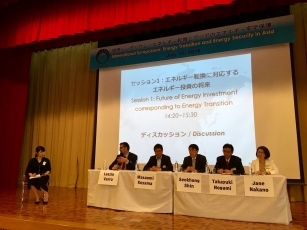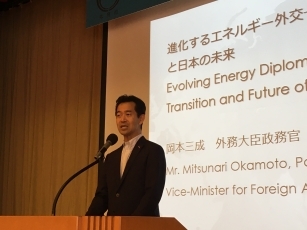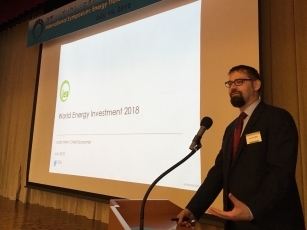Energy
International Symposium: Energy Transition and Energy Security in Asia
July 19, 2018
- 1. On July 19th, the Ministry of Foreign Affairs hosted “International Symposium: Energy Transition and Energy Security in Asia” at Mita Conference Hall with approximately 200 participants with pariticipation from Mr. Mitsunari Okamoto, Paliamentary Vice-Minister for Foreign Affairs, Mr. Laszlo Varro, Chief Economist of the International Energy Agency (IEA), energy experts, government officials, corporate stakeholders, researchers, members of diplomatic corps in Tokyo, media personnel, among others.
- 2. Parliamentary Vice-Minister Mr. Okamoto opened the symposium with the Policy Speech on energy diplomacy of Japan on behalf of Mr. Taro Kono, Minister for Foreign Affairs, titled “Evolving Energy Diplomacy - Energy Transition and Future of Japan.
 " The speech highlighted the willingness of the Ministry of Foreign Affairs of Japan to further pursue the energy diplomacy corresponding to the changing global energy landscape and energy transitions, while introducing the ministry’s ongoimg efforts in firstly, promoting the diplomatic stragety on energy and resources “Global vision for a shared future”, secondly, launching “renewable energy diplomacy”, and thirdly, providing information about the global trend in renewables deployment to the Japanese audience, in the midst of accelerating global endevours towards decarbonization triggered by the entry info force of the Paris agreement as well as the cataclysmic change both on supply side and demand side of energy system.
" The speech highlighted the willingness of the Ministry of Foreign Affairs of Japan to further pursue the energy diplomacy corresponding to the changing global energy landscape and energy transitions, while introducing the ministry’s ongoimg efforts in firstly, promoting the diplomatic stragety on energy and resources “Global vision for a shared future”, secondly, launching “renewable energy diplomacy”, and thirdly, providing information about the global trend in renewables deployment to the Japanese audience, in the midst of accelerating global endevours towards decarbonization triggered by the entry info force of the Paris agreement as well as the cataclysmic change both on supply side and demand side of energy system. - 3. The speech was followed by the keynote speech by Mr. Laszlo Varro, Chief Economist of IEA, on “World Energy Investment 2018
 ” just launched on July 17th(Presentation Slides (PDF)
” just launched on July 17th(Presentation Slides (PDF) ). Mr. Varro pointed out that global energy investment has declined for the third consecutive year due to smaller investment in power sector and lower cost in oil and gas sector, and also the output from wind and solar is compensating the slowdown of nuclear and hydro, and added that the public spending on clean energy related R&D rose by 13 % in 2017 after several years of stagnation.
). Mr. Varro pointed out that global energy investment has declined for the third consecutive year due to smaller investment in power sector and lower cost in oil and gas sector, and also the output from wind and solar is compensating the slowdown of nuclear and hydro, and added that the public spending on clean energy related R&D rose by 13 % in 2017 after several years of stagnation. - 4. The following two panel sessions featured the prospect of energy investment to better reflect the energy transition. Moderaters indicated the understanding that the energy investment stands at the critical juncture in light of the rapid global deployment of renewables, together with the divestment trend from fossil fuels with coal on top of it. The discussion centred on the question of how optimal energy investment should be, in responding to the energy transition calls with due consideration on the latest state-of-play. Furthermore, the experts discussed the necessary policies and challenges to be overcome for Asia, the global centre of energy demand, to achieve energy transitions and enjoy more prosperous life based on the recent analysis in the energy field.
- 5. Throughout the symposium, active and informative discussion was held among participants by bringing together latest analysis, research outcomes and various exepertise with a view to identifying a future direction of efforts to strengthen Asia’s energy security and it has resulted in sharing practical and useful information and expertise. This symposium also provided a significant opportunity for many participants from both public and private as well as for Japanese and non-Japanese, to build a wider network for the future.





 (702KB)
(702KB)